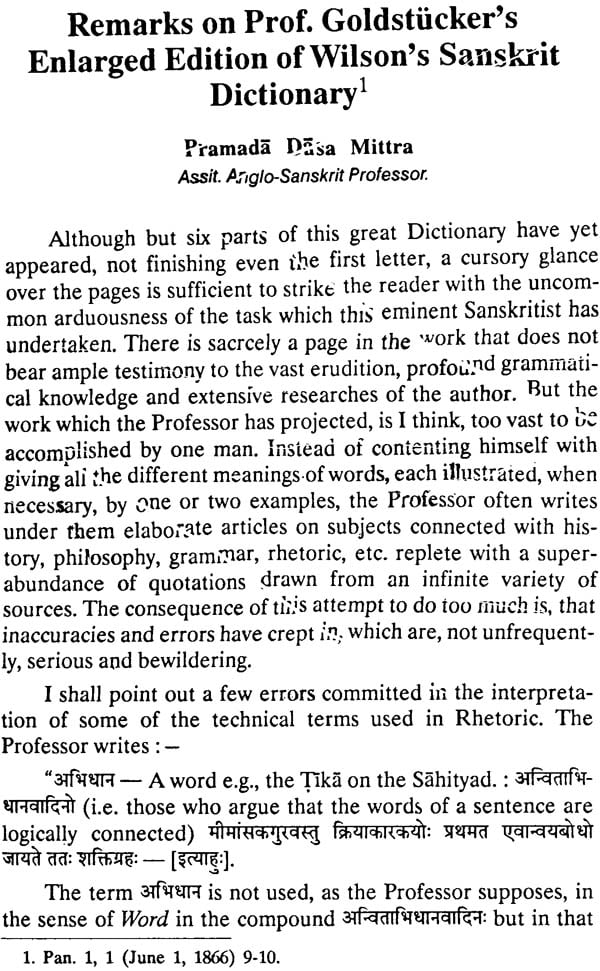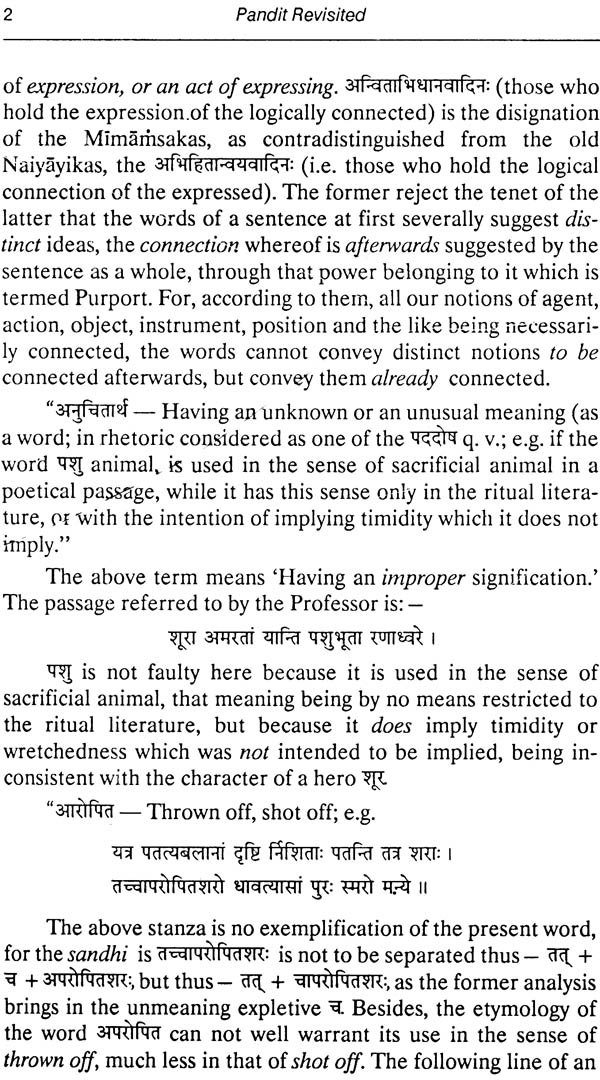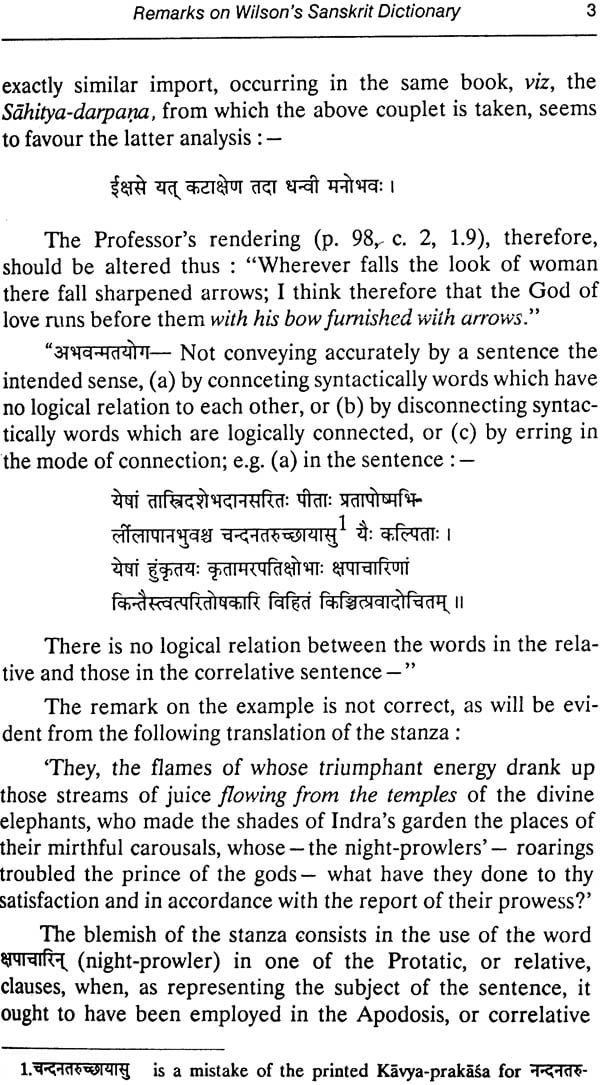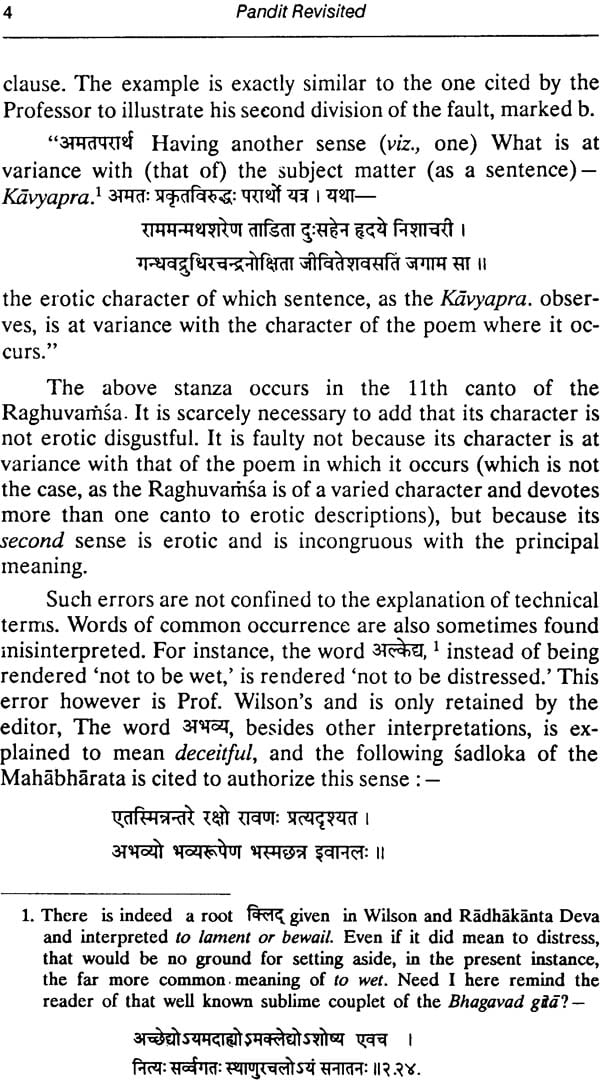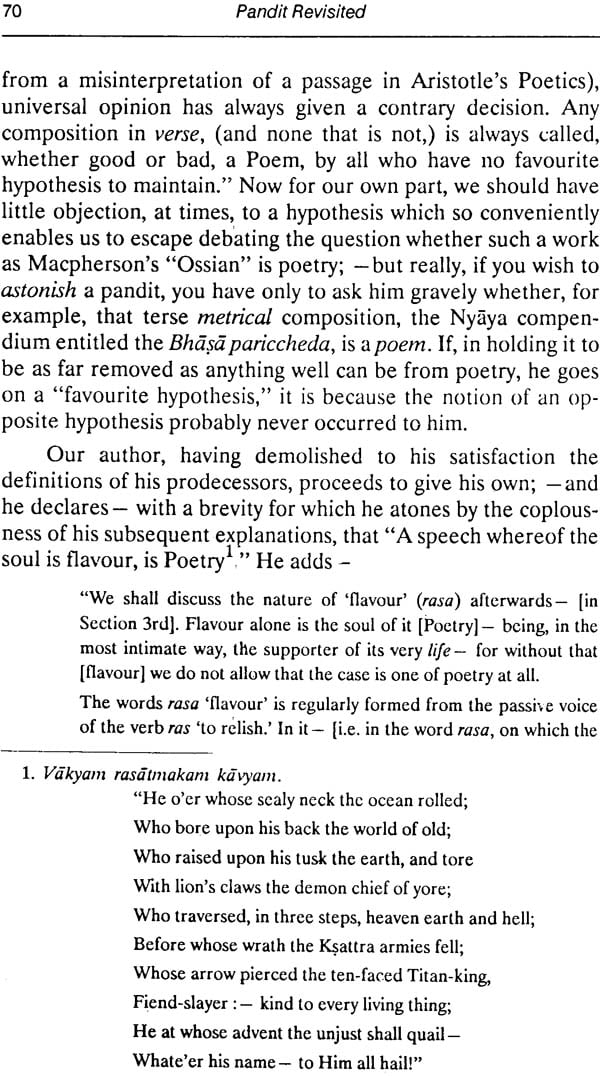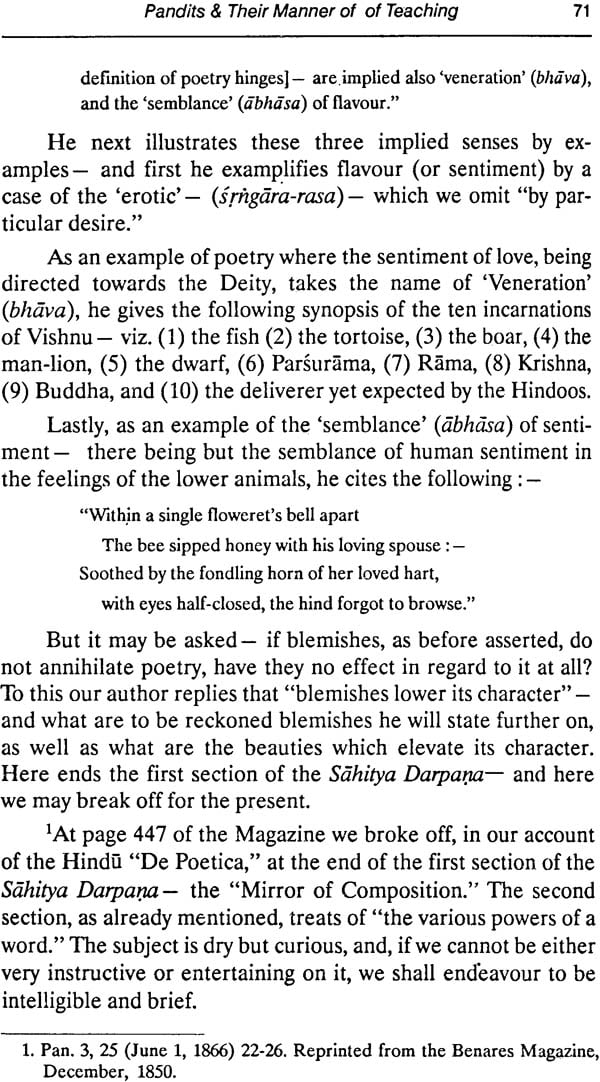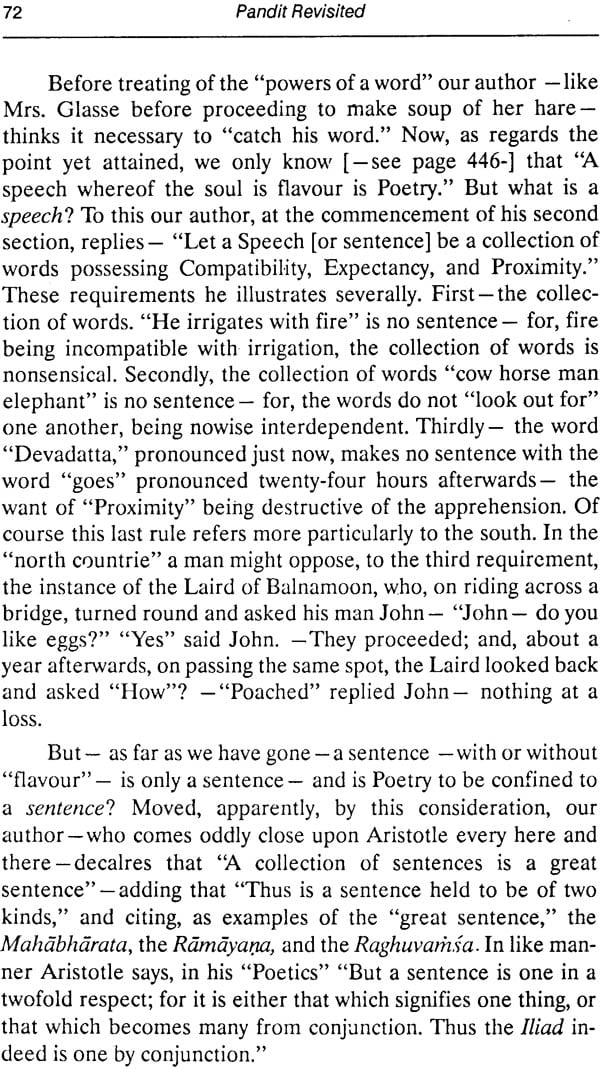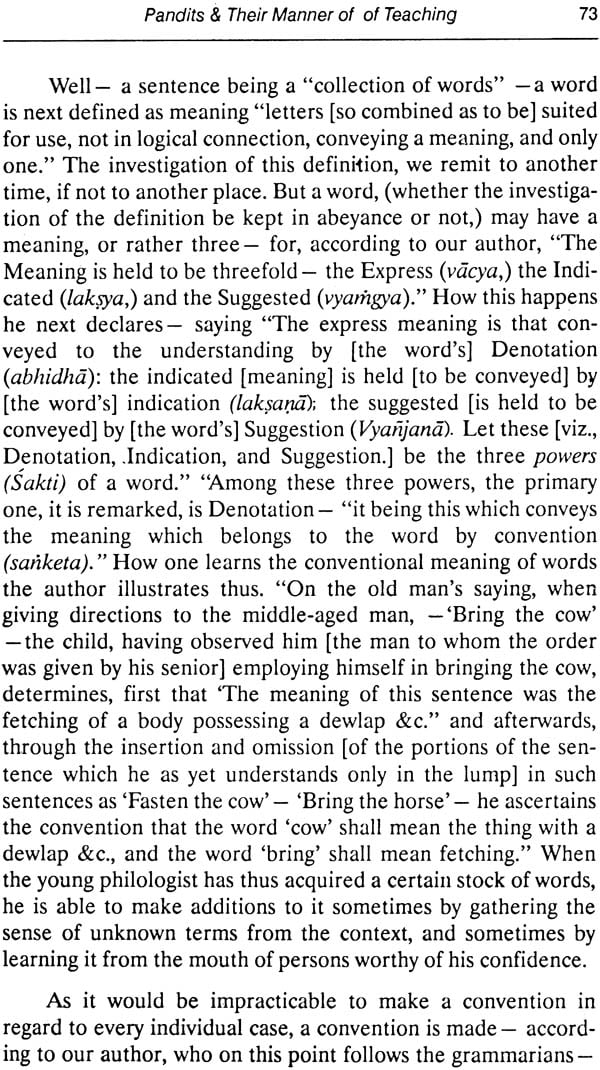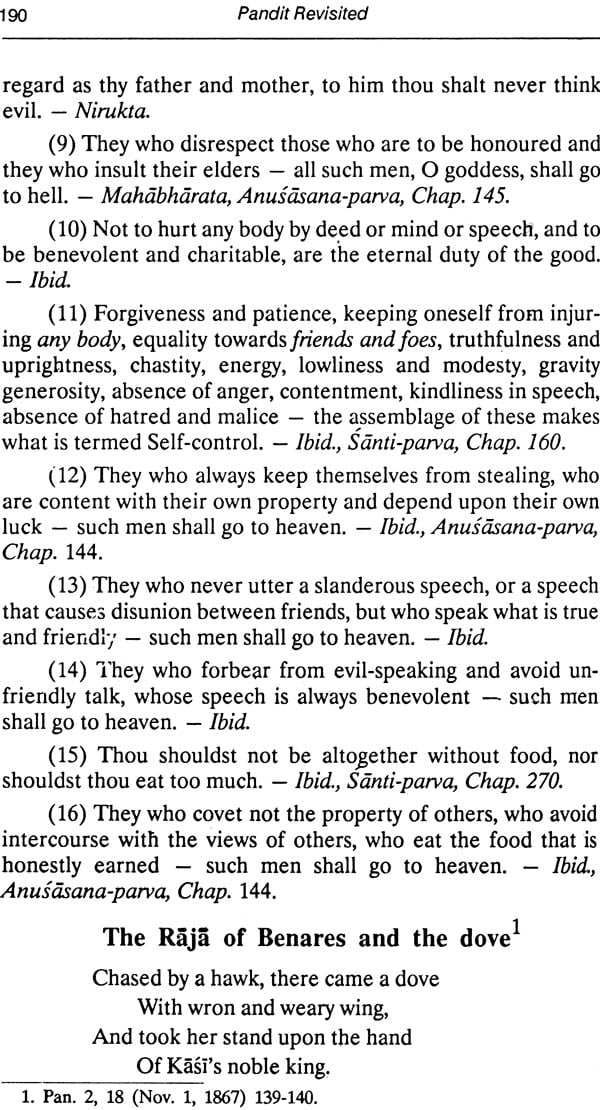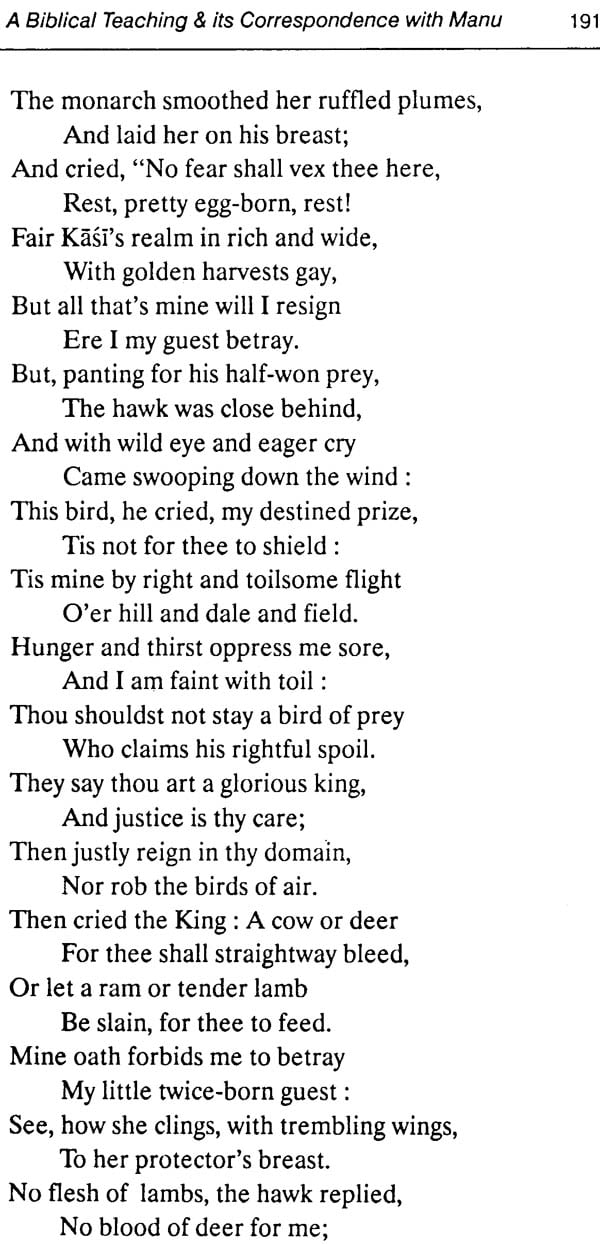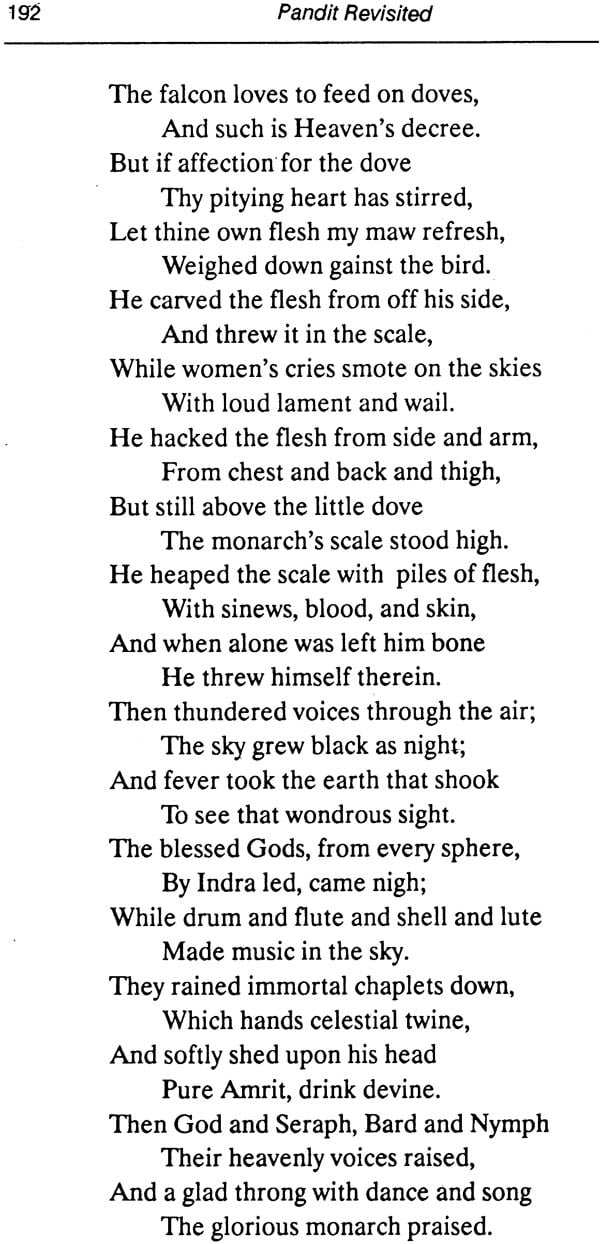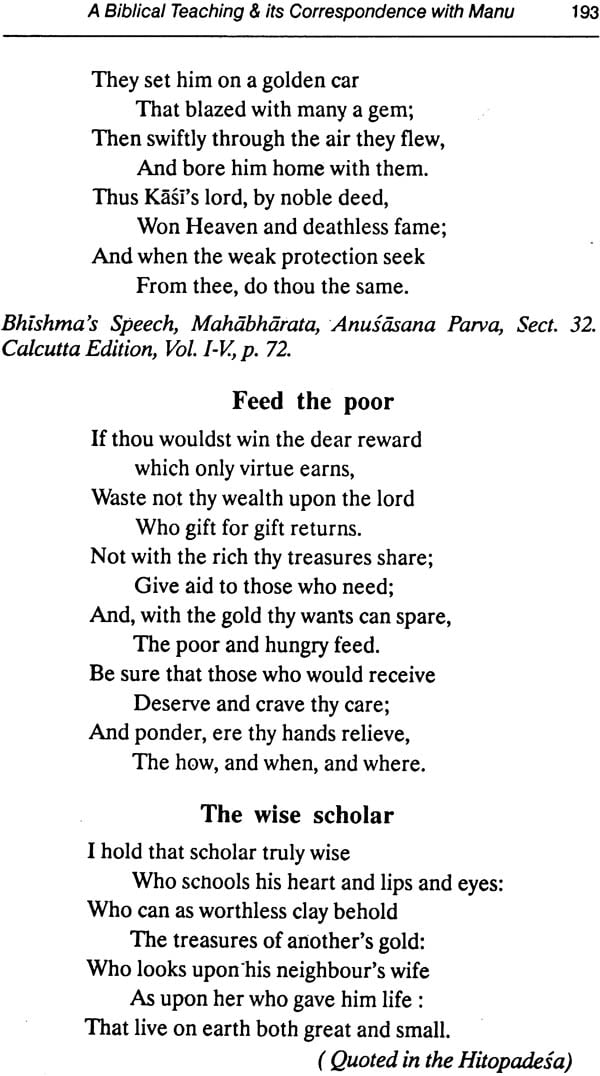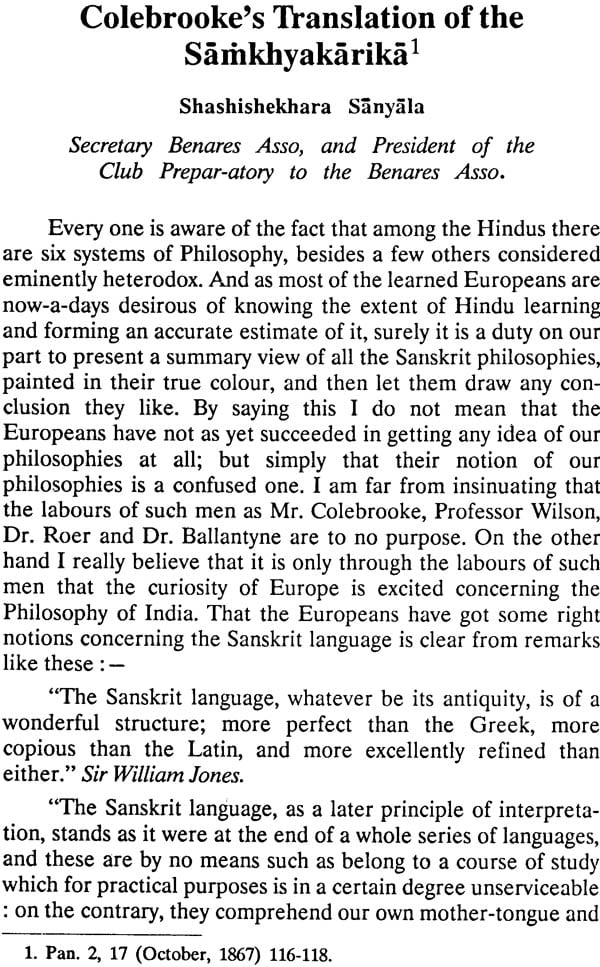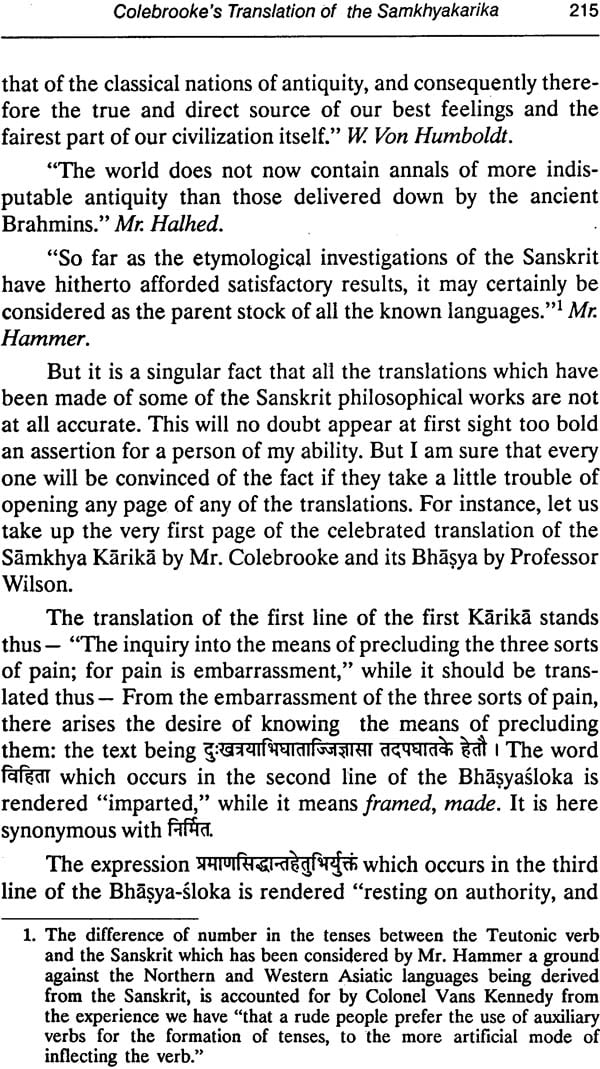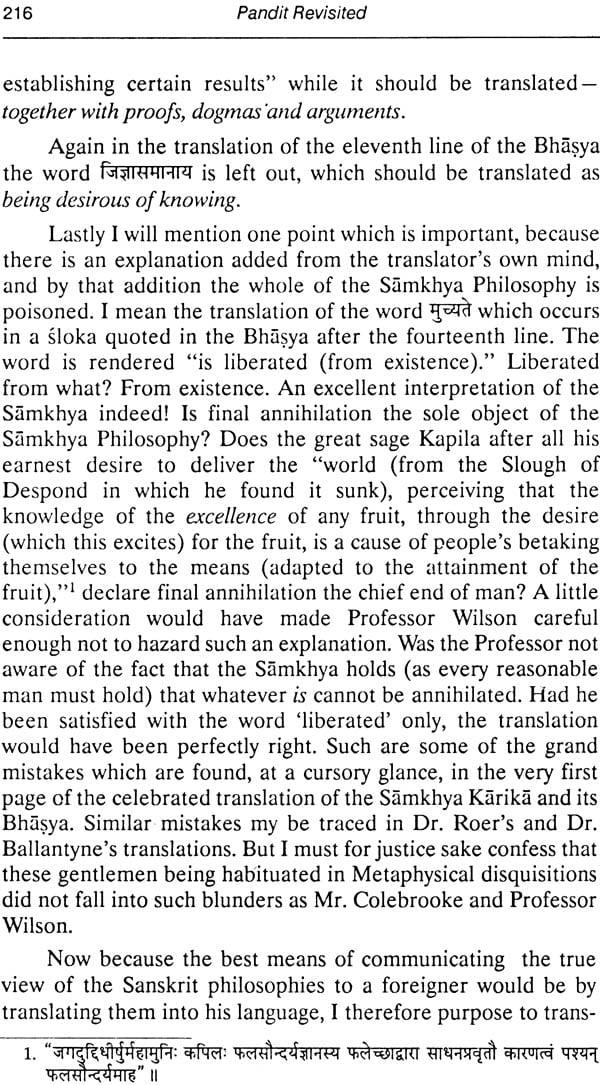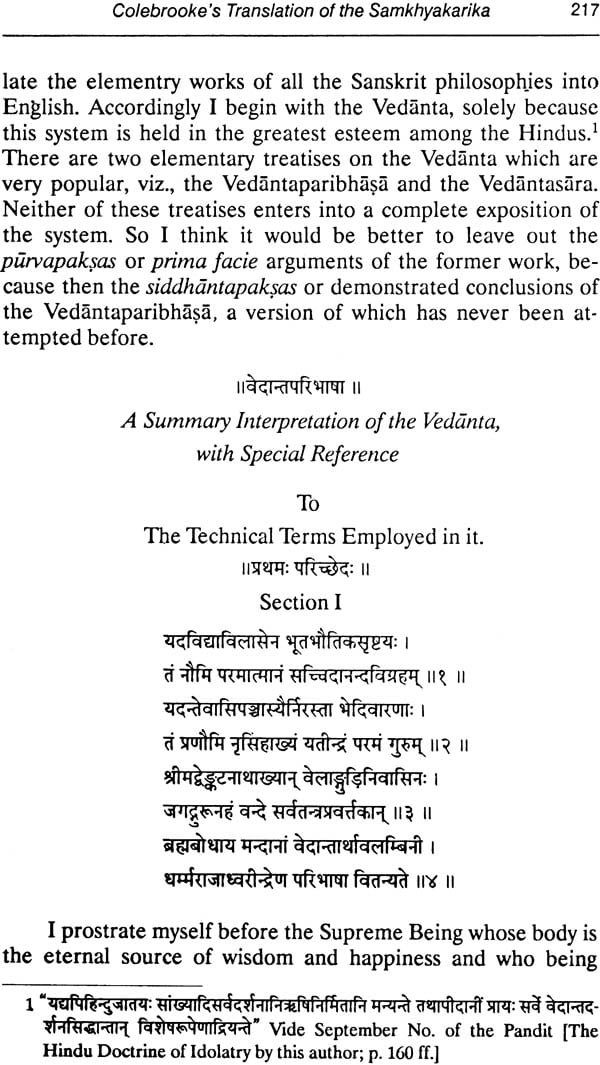
Pandit Revisited
Book Specification
| Item Code: | IDJ279 |
| Author: | Dr. Vidyaniwas Misra, Edited by Dr. B. N. Misra |
| Publisher: | Sampurnanand Sanskrit University |
| Language: | English |
| Edition: | 1991 |
| Pages: | 247 |
| Cover: | Hardcover |
| Other Details | 9.8" X 6.2" |
Book Description
From the Jacket
The Pandit also called Ka si-Vidya Sudha-Nidhi, was a monthly journal of The Nenares college (Presetly the Sampurnanand Sanskrit University, Varanasi) devoted to Sanskrit literature. This pioneering journal in the field of Sanskrit appeared from 1866 till 1917. after being published regularly for almost fifty years, it was withdrawn owing chiefly to the lack of support in 1917. The journal mainly aimed at publishing unpublished Sanskrit texts, but it also contained gleaning from reports, research articles, book-reviews etc., both in English and Sanskrit.
Sampurnanand Sanskrit University has taken up the much awaited task of bringing out reprints of such selected materials from the file of The Pandit which are not available outside its pages. The first part of the Pandit Revisited contains a selection of articles in English originally appeared in The Pandit, old series, volume I-X (1866-1876).
Some of the important articles are: (i) Ballantyne: On the Nyaya System of Philosophy; The Pandits and Their Manner of Teaching, on the Ontology of the Vedanta, (ii) Fitz-EdwardHall: Benares, Ancient and Medieval, (iii) A. E. Gough: widow-Marriage; Ancient Indian History, (iv) Sivaprasad: The Nenares Pillar Inscription; Prophecy in Favour of the British government etc.
The Volume projects a plain picture of Indological studies in the later half of the 19th century. These are also significant sources of academic research in Indology.
Subsequent parts in this series are under print.
Pandita Parikrama the Sampurnanand Sanskrit University has planned to reprint of selected articles, books and monographs printed in Sanskrit in the Pandita (1866-1917) duly edited under the title Pandita Parikrama. The first two volumes have already been published in 1991.
Foreword
The Pandit, also called Kasi-vidya-sudha-nidhi, has made a mark in the field of Sanskrit studies as it is the first journal in Sanskrit, published from 1866 to 1917 A. D. The journal was aimed at publishing unpublished texts primarily, but it also published book-reviews, gleanings from reports and research articles, both in Sanskrit and English.
Sampurnanand Sanskrit University has taken up the much awaited task of bringing out reprints of such selected materials from the file of The Pandit from 1866-1917 A. D., as are not available outside its pages and bear upon the importance of Sanskrit studies. We have already published two volumes in Sanskrit under the title The Pandita Parikrama, volumes 1 and 2
It gives me great pleasure in bringing out the first volume of the second series of The Pandit in English entitled The Pandit-Revisited. This volume contains articles from The Pandit in English from 1866 to 1876 to 1876 A. D.
Some of the important articles are the papers of Dr. J. R. Ballantyne on Indian philosophy, e.g. 'On the Nyaya System of Philosophy'; 'The Eternity of Sound-A Dogma of the Mimamsa'; The Gist of the Vedanta Philosophy, etc., Fitz-Edward Hall's documentation on Benares and Rev. Sherring's paper entitled 'The Bhars'. There are two other important papers by A. E. Gough on 'Widow-Marriage' and 'Ancient Indian History'. There are some valuable notes, by Indian scholars-Shashi Shekhara Sanyala, Babu Sivaprasad, Pramadadasa Mittra, etc.
Besides, the two notes on the prospective project of translation of the Rigveda Samhita by Max Muller, would be of great interest to bibliographers.
This volume projects a plain picture of Indological studies in the later half of the 19th century. These are also significant sources of academic research in Indology. The article of Dr. Ballantyne 'The Pandits and Their Manner of Teachings' is of a great dimensional value. It deals with the problems of communication between western scholars and Sanskrit Pandits. He has also dealt with the texts taught also with the methodology of teaching those texts by giving suitable examples. This paper indicates the typical European response to a different type of traditions and is, therefore, of great interest to us. Hall's paper on Benares as a nucleus of culture is one of the first, succeeding James Prinsep's The Benares Illustrated.
I hope, this selection would give a total picture of the standpoint of western scholars associated with the erstwhile Queen's College, Benares, with regard to the scholastic tradition. One may not agree with some of their views as I myself do not agree with them but, as the first western confrontation to India's scholastic tradition, it is of great interest today when we are looking forward to a possiblilty of dialogue between the two traditions. This volume would, indeed, provide a good background for initiating such a dialogue.
Kasi- Vidya-Sudha-Nidhi, or to give its English title The Pandit was a monthly journal of the Benares College, devoted to Sanskrit literature. It appeared from June, 1866 to September, 1917. The first ten volumes, in larger size (34 x 20 ems.) published from June 1866 to May, 1876, consist of its Old Series. The subsequent volumes, in smaller size (22 x 13 ems) and numbered afresh from vol. I - XXXIX, published between June, 1876 and September, 1917, comprise of the New Series. This pioneering journal in the field of Sanskrit learning became extinct abruptly after volume 39, no. 9 for the reasons not clear to us.
The main objective of The Pandit, as stated, was "to publish rare Sanskrit works which appear worthy of careful editing hereafter; to offer a field of discussion of con- troverted points in old Indian Philosophy, Philology, History and Literature, to communicate ideas between the Aryan scholars of the East and of the West- between the Pandits of Benares and Calcutta - and the Sanskritists of the Universities of Europe." The Journal published, chiefly, articles, excerpts from reports, brief communications, review articles, biographical sketches, original works in Sanskrit, commentaries on them or English translation and also Sanskrit rendering of some major works of western philosophy. Since the files of The Pandit are practically inaccessible to scholars in libraries at present, reprint of the materials in the journal for their benefit has been a long desideratum. In our initial step in this direction, a selection of writings in Sanskrit from the first five volumes of The Pandit have already been brought out under the title Pandita - Parikrama.
As a next step, a selection of some 35 articles in English, contained in the first ten volumes of The Pandit (Old Series), is now being published here under the title Pandit Revisited. These articles, originally appearing in instalments, are arranged thematically and duly edited to suit the needs of the present day readership. A complete list of English writings in the above ten volumes of the old series of The Pandit is given below for convenience to the. readers :
| 1 | Foreword | I-ii |
| 2 | Preface - Dr. B. N. Misra | iii-xii |
| 3 | Remarks on Prof. Goldstucker's Enlarged Edition of Wilson's Sanskrit Dictionary | 1-5 |
| 4 | On the Nyaya System of Philosophy, and the Correspondence of its Divisions with those of Modern Science | 6-27 |
| J. R. Ballantyne | ||
| 5 | The Eternity of Sound : A Dogma of Mimamsa | 28-41 |
| J. R. Ballantyne | ||
| 6 | Manu's Bull | 42-43 |
| John Muir | ||
| 7 | The Pandits and their Manner of Teaching | 44-82 |
| J. R. Ballantyne | ||
| 8 | The Gist of the Vedanta as a Philosophy | 83-92 |
| J. R. Ballantyne | ||
| 9 | On the Ontology of the Vedanta | 93-110 |
| J. R. Ballantyne | ||
| 10 | Benares, Ancient and Medieval A Monograph | 111-128 |
| Fitz-Edward Hall | ||
| 11 | The Bhars | 129-140 |
| Rev. M. A. Sherring | ||
| 12 | Widow-marriage | 141-142 |
| A. E. Gough | ||
| 13 | Ancient Indian History | 143-147 |
| A. E. Gough | ||
| 14 | Asita And Buddha or Indian Simeon | 148-154 |
| John Muir | ||
| 15 | Pandit Prema Chandra Tarkabagis An Obituary | 155-157 |
| 16 | Pandit Hiranand Chaube An Obituary | 158-159 |
| An Admirer | ||
| 17 | The Hindu Doctrine of Idolatry | 160-167 |
| Shashi Shekhara Sanyala | ||
| 18 | On Different Breeds of Horses | 168-169 |
| Leon Rodet | ||
| 19 | On the Word Barbara | 170 |
| Sivaprasad | ||
| 20 | Suggestion for the Improvement of The Pandit | 171-172 |
| 21 | The Benares Pillar Inscription | 173-175 |
| Sivaprasad | ||
| 22 | Remarks on a Copper Land-Grant Of Jaya Chandra | 176-181 |
| 23 | On English Translation Of Sanskrit Works | 182-185 |
| 24 | A Biblical Teaching and its Correspondence with Manu | 186-193 |
| Pramadadasa Mittra. | ||
| 25 | A Prophecy in Favour of the British Government | 194-195 |
| Sivaprasad | ||
| 26 | Proposed Edition of Sanskrit Classics | 199-202 |
| G. Buhler and F. Kielhorn. | ||
| 27 | Kalidasa and M. Hippolyte Fauche | 203-203 |
| 28 | Pandit Ram Jasan's Hitopadesa | 206-207 |
| 29 | The Riju Vyakhya | 208-210 |
| 30 | Banerjea's Edition of Kumara-Sambhava : A Review | 211-213 |
| 31 | Colebrooke's Translation of the Samkhyakarika | 214-220 |
| Shashishekhara Sanyala | ||
| 32 | Prospectus of the Rig-Ved Translation | 221-224 |
| Max Muller. | ||
| 33 | Pratna-Kamra-Nandini: A Review | 225-226 |
| 34 | Dr. Haug on the Word Brahma | 227-228 |
| 35 | Arya-Vidya-Sudhakara: A Review | 229-230 |
